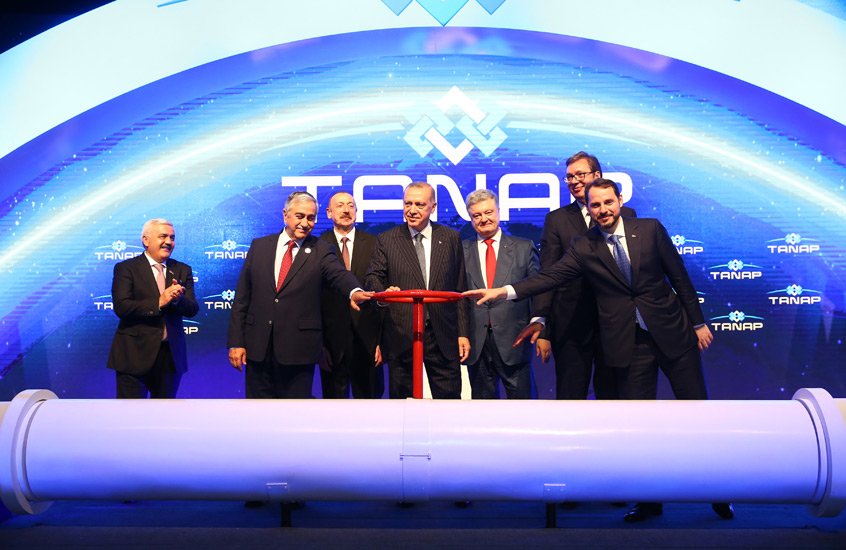Azerbaijan’s President İlham Aliyev and Turkey’s Recep Tayyip Erdoğan formally inaugurated the Trans-Anatolian Natural Gas Pipeline (TANAP) in Eskişehir, Turkey, on June 12, 2018.
Joining them at the opening ceremony were Serbian President Aleksandar Vucic, Ukrainian President Petro Poroshenko, and Turkish Cypriot President Mustafa Akıncı, along with energy ministers, diplomats and executives of energy companies.
Addressing the dignitaries at the event, President Erdoğan said: “This project is a product of a close friendship between Turkey and Azerbaijan. Transit countries have also played a key role. With this project, gas from Azerbaijan will be carried to Europe for the first time.”
The Turkish president noted the previous close cooperation between Turkey, Azerbaijan and Georgia to deliver the Baku-Tbilisi-Ceyhan oil pipeline, which opened in 2005. He stated that the new trans-Anatolian pipeline, which cost $8.5 billion, will play a significant role in generating peace and stability in the region, as well as improving the welfare of people whose countries the new pipeline runs through.
TANAP is “the largest diameter pipeline ever built and the ninth longest in the world”
President Erdoğan also thanked the European Union and for their support of the project, which took four years to build. The EU views TANAP as providing an important alternative to the gas supplied by Russia.
Described in a statement by the Turkish presidency as “the backbone of the Southern Gas Corridor”, TANAP will transport natural gas produced in Azerbaijan’s Shah Deniz-2 gas field in the Caspian Sea – one of the world’s largest gas fields. This gas and those from other fields south of the Caspian Sea will be transported to Turkey and on to Europe via several routes including the Trans-Adriatic Pipeline (TAP) that is set to run between Greece, Albania and Italy.
According to John Milford, WorleyParsons Major Projects’ Director, which helped build the 1,850 km gas pipeline, TANAP is “the largest diameter pipeline ever built and the ninth longest in the world”. The 56-inch diameter pipeline is expected to start carrying Azeri gas to Eskişehir from 1 July.
The pipeline’s initial annual capacity is estimated at 16 billion cubic meters (bcm) of gas, gradually increasing to 31 bcm. Of this, around 6 bcm will be for Turkish consumption, with the remaining gas supplied to Europe.
“TANAP’s commissioning is a giant leap towards Turkey’s ambition of becoming a gas transit hub”
Wood Mackenzie’s research analyst for Caspian and Europe Upstream, Alasdair Morrison, described TANAP’s commissioning as, “a giant leap towards Turkey’s ambition of becoming a gas transit hub. Together with flows from TurkStream, it will increase the amount of gas passing through Turkey to Europe by roughly 26 Bcm/y by 2023.”
TANAP has multiple shareholders: Azerbaijan’s SOCAR (the Azeri Republic’s state-owned oil and gas company) owns a 51 percent stake, Turkey’s BOTAŞ has 30 percent, BP has 12 percent, and SOCAR Turkey has 7 percent.
Turkey, Azerbaijan and Georgia continue to forge ever-closer ties through these major transnational infrastructural and energy projects. In addition to TANAP and the Baku-Tbilisi-Ceyhan pipeline, the shared vision of the three states have resulted in the Baku-Tbilisi-Erzurum oil and natural gas pipelines, and more recently, the Baku-Tbilisi-Kars railway.




